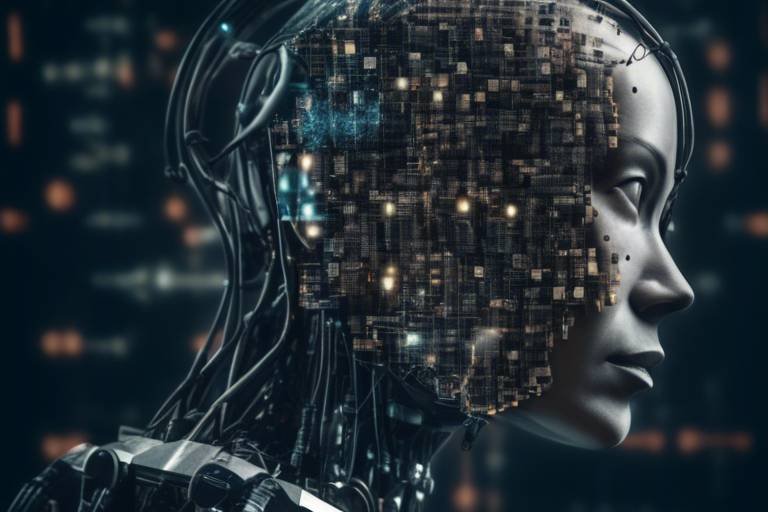AI Ethics In Novel Tech-Bio Integrations
As we stand on the precipice of a new era in technology, the fusion of artificial intelligence with biotechnology opens up a world of possibilities that were once confined to the realm of science fiction. Imagine a future where AI can analyze genetic data to predict diseases before they manifest, or where it can assist in creating personalized medicine tailored to an individual's unique genetic makeup. However, with these groundbreaking advancements come a plethora of ethical dilemmas that we must navigate carefully. The question arises: how do we ensure that these powerful tools are used responsibly and ethically?
At its core, the integration of AI in biotechnology isn't just about enhancing capabilities; it's about making choices that reflect our values as a society. The ethical implications are profound and multifaceted, requiring us to consider not just what we can do with these technologies, but what we should do. As we delve deeper into this topic, we will explore the ethical challenges that accompany these innovations, from issues of consent and privacy to the equitable distribution of technology. This journey will highlight the necessity of establishing robust frameworks and engaging a diverse array of stakeholders to ensure that the benefits of AI in biotechnology are accessible to all, while also safeguarding individual rights and societal values.
AI ethics encompasses the moral considerations surrounding the development and deployment of artificial intelligence systems, focusing on fairness, transparency, accountability, and the impact on society. As we integrate AI into biotechnology, these principles become even more critical. Fairness ensures that no group is disproportionately disadvantaged by AI technologies, while transparency fosters trust between developers and users. Accountability means that there are consequences for misuse or harm caused by AI systems, and the societal impact requires us to reflect on how these technologies will shape our future.
The integration of AI in biotechnology presents unique ethical dilemmas, including issues of consent, privacy, and the potential for misuse of genetic information. As we harness AI to analyze vast amounts of genetic data, we must ask ourselves: Are individuals fully aware of how their data will be used? Are they able to give informed consent in a landscape that is often complex and difficult to navigate?
Informed consent is crucial in biotechnology, ensuring that individuals understand the implications of AI applications in genetic research and treatment options. This process is not merely a formality; it involves educating individuals about the potential risks and benefits associated with AI technologies. The challenge lies in simplifying complex information so that it is accessible without compromising its integrity. After all, if people are to make informed choices about their health and genetic data, they must first comprehend the ramifications of those choices.
Maintaining patient autonomy is essential, allowing individuals to make informed decisions regarding their genetic data and AI interventions. The principle of autonomy underscores the importance of respecting individuals' rights to control their own bodies and personal information. When AI is involved in decision-making processes, we must ensure that it enhances, rather than undermines, this autonomy. Empowering patients with knowledge and options is vital in fostering a healthcare environment that values personal choice and dignity.
Data privacy concerns arise when sensitive genetic information is processed by AI systems, necessitating robust protections to safeguard personal data. In an age where data breaches are alarmingly common, the stakes are incredibly high. The potential for misuse of genetic information can lead to discrimination, stigmatization, and a loss of trust in healthcare systems. To mitigate these risks, we must prioritize the implementation of stringent data protection measures and ensure compliance with ethical standards, creating a safe haven for individuals to share their genetic information without fear.
Ensuring equitable access to AI-driven biotechnologies is vital to prevent disparities in healthcare and research opportunities among different populations. As we develop cutting-edge technologies, we must remain vigilant against the risk of creating a two-tiered system where only affluent individuals or communities benefit from advancements. Equity in access means actively working to dismantle barriers that prevent marginalized groups from reaping the rewards of AI in biotechnology. This requires collaboration between governments, organizations, and communities to foster inclusive practices that prioritize the needs of all.
Effective regulatory frameworks are needed to govern the ethical use of AI in biotechnology, balancing innovation with safety and ethical considerations. These frameworks should not stifle creativity but rather guide it, ensuring that as we push the boundaries of what is possible, we do so responsibly. The challenge lies in creating regulations that are flexible enough to adapt to rapid technological advancements while maintaining rigorous ethical standards.
Developing global standards for AI ethics in biotechnology can promote consistency and accountability across borders, fostering trust in technology. In a world that is increasingly interconnected, having a unified approach to ethical standards can help mitigate risks associated with varying regulations in different regions. This not only enhances trust among stakeholders but also facilitates collaboration on a global scale, allowing for shared knowledge and resources.
Engaging diverse stakeholders, including ethicists, scientists, and the public, is essential to address ethical concerns and shape responsible AI practices in biotechnology. A multi-faceted approach to stakeholder engagement ensures that a wide range of perspectives are considered, leading to more comprehensive and effective solutions. By fostering dialogue between technologists and the communities they serve, we can create a more inclusive environment that prioritizes ethical considerations in every step of the process.
- What are the main ethical concerns regarding AI in biotechnology? The primary concerns include informed consent, data privacy, and equitable access to technology.
- How can we ensure informed consent in genetic research? By simplifying complex information and providing clear explanations of potential risks and benefits.
- Why is equity in access to technology important? To prevent disparities in healthcare and ensure that all populations benefit from advancements in AI and biotechnology.
- What role do global standards play in AI ethics? They promote consistency and accountability, fostering trust and collaboration across borders.

Understanding AI Ethics
When we talk about AI ethics, we're diving into a complex ocean of moral considerations that shape how artificial intelligence is developed and deployed. Imagine you’re at a crossroads, where every path leads to a different ethical landscape. The choices we make today regarding AI can ripple through society, affecting everything from our privacy to our jobs. So, what exactly does AI ethics entail? It's all about ensuring that AI systems operate in a manner that is fair, transparent, and accountable. Think of it as a compass guiding us through the uncharted waters of technology.
At its core, AI ethics examines how these systems impact society at large. It's not just about the technology itself but also about the people who create and use it. For instance, when AI algorithms are trained on biased data, they can perpetuate existing inequalities, leading to unfair outcomes in critical areas like hiring practices or law enforcement. The challenge here is to create AI that not only performs efficiently but also respects the diverse fabric of our society.
Another critical aspect of AI ethics is transparency. Imagine if you were using a navigation app that never explained how it determined the best route. You’d probably feel uneasy, right? Similarly, AI systems should be able to explain their decisions in a way that users can understand. This transparency fosters trust and allows individuals to make informed choices. After all, in a world where machines make decisions, we need to ensure that those decisions are justifiable and ethical.
Moreover, accountability is a cornerstone of AI ethics. If an AI system makes a mistake—say, misdiagnosing a medical condition—who is responsible? Is it the developer, the data provider, or the user? This question is paramount as we integrate AI into critical sectors like healthcare and finance. Establishing clear lines of accountability helps mitigate risks and ensures that there are mechanisms in place to address any ethical breaches.
In summary, understanding AI ethics is not just an academic exercise; it’s a vital necessity as we embrace these technologies. By focusing on fairness, transparency, and accountability, we can navigate the ethical dilemmas posed by AI, ensuring that these innovations serve humanity rather than undermine it. As we move forward, it’s crucial that we keep these principles at the forefront of our discussions about AI and biotechnology.
- What is AI ethics? AI ethics refers to the moral principles guiding the development and implementation of artificial intelligence systems.
- Why is transparency important in AI? Transparency allows users to understand how AI systems make decisions, fostering trust and informed choices.
- How can we ensure accountability in AI systems? Clear regulations and guidelines must be established to determine responsibility for AI decisions and actions.

Ethical Challenges in Biotechnology
The integration of artificial intelligence in biotechnology is like opening a Pandora's box filled with both incredible potential and daunting ethical challenges. As we delve into this uncharted territory, we must consider the implications of our actions and the moral responsibilities that come with them. One of the most pressing ethical dilemmas is the issue of informed consent. In biotechnology, informed consent is not just a formality; it’s a fundamental principle that ensures individuals are fully aware of the risks and benefits associated with AI applications in genetic research and treatment options.
Imagine a scenario where a patient is offered a cutting-edge AI-driven treatment for a genetic disorder. While the technology might promise miraculous results, do they truly understand the implications of their decision? Are they aware of how their genetic data will be used, who will have access to it, and what the long-term effects might be? This lack of understanding can lead to a significant erosion of patient autonomy. It’s crucial that individuals feel empowered to make informed decisions regarding their genetic data and the potential interventions that AI may propose.
Informed consent goes beyond just signing a document; it requires a transparent dialogue between healthcare providers and patients. This dialogue must encompass not only the technical aspects of the treatment but also the ethical considerations surrounding it. For instance, if a patient consents to participate in a study that utilizes AI to analyze their genetic data, they should be made aware of the potential for their information to be shared with third parties or used for purposes beyond the original intent. This leads us to another critical concern: data privacy.
As AI systems process sensitive genetic information, the risk of data breaches and misuse escalates. Imagine your most private health information being exposed or exploited without your knowledge. The thought alone is unsettling, and it underscores the necessity for robust protections to safeguard personal data. Organizations must implement stringent data security measures and ensure compliance with regulations like the General Data Protection Regulation (GDPR) to maintain trust and protect individuals’ rights.
Moreover, the ethical challenges don’t stop there. The potential for misuse of genetic information raises questions about how this data could be leveraged by employers, insurance companies, or even governments. The specter of genetic discrimination looms large, where individuals might face adverse consequences based on their genetic makeup. This is not just a technological issue; it’s a profound ethical dilemma that requires our immediate attention.
Another significant ethical challenge in the realm of AI and biotechnology is ensuring equitable access to these advanced technologies. As these innovations continue to evolve, there is a real risk of widening the gap between those who can afford such technologies and those who cannot. This disparity can lead to unequal healthcare outcomes, exacerbating existing inequalities in society. For instance, if only affluent populations have access to AI-driven treatments, what does that say about our commitment to fairness and justice in healthcare?
To address these ethical challenges, it’s essential to foster an environment of inclusivity and collaboration among various stakeholders. By engaging ethicists, scientists, policymakers, and the public in meaningful discussions, we can work towards creating a framework that prioritizes ethical considerations while promoting innovation. The future of biotechnology and AI holds immense promise, but it must be navigated with caution and a strong ethical compass.
- What is informed consent in biotechnology? Informed consent is the process by which individuals are made aware of the risks and benefits of a treatment or study, allowing them to make knowledgeable decisions regarding their participation.
- Why is data privacy important in AI and biotechnology? Data privacy is crucial because sensitive genetic information can be misused if not properly protected, leading to potential discrimination or breaches of personal privacy.
- How can we ensure equitable access to AI-driven biotechnologies? By implementing policies that promote affordability and accessibility, we can help bridge the gap between different populations and ensure fair healthcare opportunities.

Informed Consent
Informed consent stands as a cornerstone of ethical practice in the realm of biotechnology, particularly when artificial intelligence (AI) is introduced into the mix. But what does it really mean to give informed consent? It goes beyond merely signing a document; it involves a comprehensive understanding of the potential risks, benefits, and implications of participating in AI-driven genetic research or treatments. Imagine stepping into a complex maze without a map—this is how individuals can feel when they are not adequately informed. It's essential that they know not just the 'what' but also the 'why' and 'how' of the technology that is being applied to their genetic data.
The process of obtaining informed consent should be transparent and thorough. Patients must be provided with clear, accessible information about the AI technologies involved, including how their data will be used, stored, and shared. This is particularly critical in a field where the stakes are high. For instance, if an AI system is designed to predict genetic predispositions to certain diseases, individuals should understand how accurate those predictions are and what actions might be taken based on them. Are they being offered a solution, or are they simply being informed of a risk?
Furthermore, informed consent must be an ongoing dialogue rather than a one-time event. As AI technologies evolve, so too do the implications of their use. New findings may emerge that could significantly alter the understanding of risks or benefits associated with a particular treatment. Therefore, it is crucial to maintain communication with patients, ensuring they are kept in the loop about any changes that might affect their consent. This is not just a legal obligation; it is a moral imperative that reinforces the trust between patients and healthcare providers.
To illustrate the importance of informed consent in AI and biotechnology, consider the following key elements that should be included in the consent process:
- Clarity: Use plain language that avoids technical jargon, making it easier for patients to grasp complex concepts.
- Comprehensiveness: Provide thorough information about the procedures, risks, and benefits involved in AI applications.
- Voluntariness: Ensure that individuals feel free to make their own choices without any coercion.
- Revocability: Allow patients the option to withdraw their consent at any time, with no negative repercussions.
Ultimately, informed consent is not just about legal compliance; it embodies respect for patient autonomy and dignity. By fostering an environment where patients feel empowered to make informed choices, we can bridge the gap between cutting-edge technology and ethical responsibility. In a world where AI is rapidly transforming healthcare, ensuring that individuals are genuinely informed is paramount. This is not just a checkbox in a process; it is the foundation upon which trust and ethical practice are built.

Patient Autonomy
When we talk about , we're diving into a fundamental principle that emphasizes the right of individuals to make their own choices regarding their health and medical treatments. In the realm of biotechnology, especially when intertwined with the capabilities of artificial intelligence, this principle takes on new dimensions. Imagine being handed the keys to your health journey, where every decision about your genetic data and treatment options is yours to make. Sounds empowering, right? But there’s a catch. With the integration of AI, the landscape becomes complex, and patients must navigate a labyrinth of information, technology, and ethical considerations.
AI technologies can offer incredible insights into genetic predispositions and potential health risks, but with that power comes the responsibility to ensure that patients are fully informed. Informed consent is not just a checkbox to tick off; it’s a vital process that ensures patients understand what AI applications can do, how their data will be used, and the implications of those choices. Without this understanding, how can one truly exercise autonomy? It’s like trying to drive a car without knowing how to operate the steering wheel. You might end up in a place you didn’t intend to go!
Furthermore, maintaining patient autonomy means respecting the choices individuals make regarding their genetic information. Some people may choose to share their data for research, while others may prefer to keep it private. This is where the ethical dilemma deepens. The integration of AI in biotechnology can lead to a situation where patients feel pressured to share their data, fearing they might miss out on potential treatments or advancements. It’s crucial that healthcare providers foster an environment where patients feel safe and empowered to make decisions that align with their values and comfort levels.
To illustrate the importance of patient autonomy in the context of AI and biotechnology, consider the following table:
| Aspect | Importance |
|---|---|
| Informed Consent | Ensures patients understand the implications of AI use in their health. |
| Respect for Choices | Allows patients to decide what happens to their genetic data. |
| Empowerment | Patients feel in control of their health decisions. |
In conclusion, as we forge ahead into this new era of AI-driven biotechnology, it’s imperative that we prioritize . This means creating systems that not only inform but also empower individuals to make choices that resonate with their personal beliefs and values. After all, the future of healthcare should not only be about advanced technologies but also about the people they serve. As we embrace these innovations, let’s ensure that the voices of patients are heard loud and clear.
- What is patient autonomy? Patient autonomy refers to the right of individuals to make informed decisions about their own health care and medical treatments.
- Why is informed consent important in biotechnology? Informed consent ensures that patients understand the implications of AI applications and how their data will be used, allowing them to make educated choices.
- How can patients maintain autonomy when using AI technologies? Patients can maintain autonomy by being informed about their options and feeling empowered to make decisions that align with their values.

Data Privacy Concerns
In the age of rapid technological advancement, the integration of artificial intelligence (AI) with biotechnology raises significant . With AI systems processing vast amounts of sensitive genetic information, the potential for misuse and unauthorized access becomes a pressing issue. Imagine your genetic data being analyzed by algorithms that can predict your health outcomes, but at what cost? The very essence of your identity is at stake, and this is where we need to draw the line.
One of the most alarming aspects is the possibility of data breaches. As we’ve seen with numerous high-profile hacks, no system is completely secure. When AI systems are involved, the consequences of a breach could be catastrophic, not just for individuals but for society as a whole. The fear of genetic discrimination looms large; what if your employer or insurance company gains access to your genetic predispositions? This scenario is not just a plot from a sci-fi movie; it is a reality we must confront.
Furthermore, the issue of informed consent becomes even more complex in this context. Individuals often do not fully understand how their data will be used or the implications of AI analysis. It's not uncommon for people to sign consent forms without grasping the long-term consequences. The challenge lies in ensuring that consent is not just a checkbox but a meaningful agreement that empowers individuals to make informed choices about their data.
To tackle these data privacy concerns, robust protections need to be implemented. Organizations must adopt best practices for data handling, including:
- Encryption: Securing genetic data through encryption can help protect it from unauthorized access.
- Access Controls: Limiting who can access sensitive data is crucial in maintaining privacy.
- Transparency: Companies must be transparent about how they use AI and genetic data, providing clear information to users.
Moreover, regulatory bodies must step in to create stringent guidelines that govern the ethical use of AI in biotechnology. These regulations should not only focus on technological advancements but also prioritize the rights of individuals. It’s essential to foster a culture of accountability where organizations are held responsible for any breaches or unethical use of data.
In conclusion, while the integration of AI in biotechnology holds immense potential for improving healthcare, it is crucial to address the accompanying data privacy concerns. By implementing robust protections, ensuring informed consent, and developing effective regulations, we can safeguard personal genetic information and maintain public trust in these groundbreaking technologies.
- What are the main data privacy concerns with AI in biotechnology? The primary concerns include data breaches, misuse of genetic information, and lack of informed consent.
- How can individuals protect their genetic data? Individuals can protect their data by understanding consent forms, advocating for transparency, and supporting regulations that prioritize data privacy.
- What role do regulations play in data privacy? Regulations set standards for data protection, ensuring organizations are accountable for safeguarding personal information.

Equity in Access to Technology
This article explores the ethical implications of integrating artificial intelligence with biotechnology, examining the challenges, benefits, and potential consequences of these advancements in various fields.
AI ethics encompasses the moral considerations surrounding the development and deployment of artificial intelligence systems, focusing on fairness, transparency, accountability, and the impact on society.
The integration of AI in biotechnology presents unique ethical dilemmas, including issues of consent, privacy, and the potential for misuse of genetic information.
Informed consent is crucial in biotechnology, ensuring that individuals understand the implications of AI applications in genetic research and treatment options.
Maintaining patient autonomy is essential, allowing individuals to make informed decisions regarding their genetic data and AI interventions.
Data privacy concerns arise when sensitive genetic information is processed by AI systems, necessitating robust protections to safeguard personal data.
When we talk about , we’re diving into a critical aspect of the AI and biotechnology landscape. Imagine a world where groundbreaking biotechnological advancements powered by AI are available only to a select few. This scenario not only raises eyebrows but also brings to light the stark reality of disparities in healthcare access. It's essential that these innovations reach everyone, regardless of their socio-economic status, geographic location, or educational background.
The benefits of AI in biotechnology are immense, ranging from personalized medicine to enhanced disease prediction models. However, if these technologies are not accessible to all, we risk creating a wider gap between different populations. For instance, rural communities often lack the resources and infrastructure to access cutting-edge healthcare technologies. This inequity can lead to a situation where only those in affluent urban areas benefit from AI advancements, leaving marginalized groups further behind.
To address these disparities, we must consider several factors:
- Investment in Infrastructure: Ensuring that healthcare facilities in underserved areas are equipped with the necessary technology and trained personnel to utilize AI effectively.
- Education and Training: Providing education and training programs for healthcare providers and patients alike to understand and utilize AI technologies.
- Policy Advocacy: Encouraging policies that promote equitable access to AI-driven biotechnologies, ensuring that they are affordable and available to all.
Moreover, it’s crucial to foster partnerships between public and private sectors to develop initiatives aimed at increasing access to these technologies. For example, collaborations could lead to mobile health clinics equipped with AI tools that travel to remote areas, providing necessary healthcare services and education. Such efforts can help bridge the gap and ensure that everyone, regardless of their circumstances, has a fair shot at benefiting from the advancements in biotechnology.
Effective regulatory frameworks are needed to govern the ethical use of AI in biotechnology, balancing innovation with safety and ethical considerations.
Developing global standards for AI ethics in biotechnology can promote consistency and accountability across borders, fostering trust in technology.
Engaging diverse stakeholders, including ethicists, scientists, and the public, is essential to address ethical concerns and shape responsible AI practices in biotechnology.
- What are the main ethical concerns regarding AI in biotechnology?
The main ethical concerns include informed consent, data privacy, and equity in access to technology. - How can we ensure equitable access to AI technologies?
By investing in infrastructure, providing education, and advocating for inclusive policies. - Why is informed consent important in biotechnology?
It ensures that individuals understand the implications of AI applications in genetic research and treatment options. - What role do regulations play in AI ethics?
Regulations help to balance innovation with ethical considerations, ensuring safety and accountability.

Regulatory Frameworks
In the rapidly evolving landscape of biotechnology, the integration of artificial intelligence (AI) presents a myriad of opportunities, but it also raises significant ethical concerns. To navigate these complexities, effective regulatory frameworks are essential. These frameworks serve as the backbone for ensuring that AI technologies in biotechnology are developed and utilized in a manner that is both ethical and safe. The challenge lies in creating regulations that are not only robust but also flexible enough to adapt to the fast-paced changes characteristic of technological advancements.
One of the primary objectives of regulatory frameworks is to balance innovation with safety. This means that while we want to encourage the development of groundbreaking AI applications in biotechnology, we must also ensure that these innovations do not compromise ethical standards or public trust. For instance, regulatory bodies must establish guidelines that dictate how AI can interact with sensitive genetic data, thereby protecting individuals' rights and privacy. Without such regulations, the potential for misuse of genetic information increases, raising concerns about discrimination and exploitation.
Moreover, the establishment of global standards is crucial. As biotechnology and AI are global industries, inconsistent regulations across countries can lead to significant ethical dilemmas. Imagine a scenario where a biotech company based in one country develops a revolutionary AI tool for genetic editing, but the ethical standards in another country allow for practices that could be deemed unethical or dangerous. To prevent such disparities, international collaboration is necessary to create a unified set of ethical guidelines that can be applied universally. This will not only promote consistency but also enhance accountability, fostering greater public trust in these technologies.
Additionally, stakeholder engagement is an essential component of effective regulatory frameworks. By involving a diverse range of stakeholders—including ethicists, scientists, healthcare professionals, and the public—regulatory bodies can gain valuable insights into the ethical implications of AI in biotechnology. This engagement ensures that regulations are not created in a vacuum but are reflective of societal values and concerns. For example, public forums and discussions can help highlight specific issues that may not be immediately apparent to policymakers, such as cultural sensitivities or differing perspectives on genetic interventions.
Ultimately, the goal of these regulatory frameworks is to create an environment where innovation can thrive while maintaining ethical integrity. As AI continues to reshape the landscape of biotechnology, it is imperative that we remain vigilant in our efforts to implement and uphold these regulations. By doing so, we can harness the full potential of AI in biotechnology, ensuring that it serves the greater good and respects the rights of all individuals.
- What are the main goals of regulatory frameworks in AI and biotechnology? The primary goals include ensuring safety, promoting innovation, protecting individual rights, and establishing global standards.
- Why is stakeholder engagement important in developing these frameworks? Engaging diverse stakeholders helps to incorporate a wide range of perspectives and ethical considerations, leading to more comprehensive regulations.
- How can global standards improve the use of AI in biotechnology? Global standards promote consistency and accountability, reducing the risk of unethical practices and fostering public trust.
- What challenges do regulatory bodies face in this field? Challenges include keeping pace with rapid technological advancements, addressing diverse cultural perspectives, and balancing innovation with ethical considerations.

Global Standards
As we navigate the complex landscape of AI ethics in biotechnology, establishing becomes a pressing necessity. These standards serve as a framework that guides the ethical integration of artificial intelligence in biotechnological applications. But why is this so important? Imagine a world where a breakthrough in genetic editing technology is available in one country but inaccessible in another due to a lack of regulation or ethical oversight. This disparity not only raises questions about fairness but can also lead to significant healthcare inequalities across different populations.
Global standards can create a level playing field, ensuring that all nations adhere to similar ethical guidelines. This consistency is crucial because the implications of AI in biotechnology can transcend borders. For instance, genetic data collected in one country might be processed in another, leading to potential breaches of privacy and ethical misuse. By implementing a set of universally accepted standards, we can foster an environment of trust and accountability, which is essential for public confidence in these technologies.
Moreover, these standards should not only focus on the technical aspects but also consider the cultural and social contexts in which they are applied. Different countries have varying perspectives on issues such as genetic modification, data privacy, and informed consent. Therefore, a one-size-fits-all approach may not be effective. Instead, the development of global standards should involve a collaborative effort among nations, ethicists, scientists, and community representatives. This engagement can help tailor guidelines that respect local values while promoting ethical practices in biotechnology.
To facilitate the establishment of these global standards, international organizations like the World Health Organization (WHO) and the United Nations (UN) should take a proactive role. They can lead discussions and create platforms for dialogue among stakeholders. Additionally, these organizations can help in the formulation of regulatory frameworks that are adaptable yet robust enough to handle the rapid advancements in AI technology.
In summary, the creation of global standards for AI ethics in biotechnology is not merely a bureaucratic exercise; it's a fundamental step toward ensuring that technological advancements benefit humanity as a whole. By uniting countries under a common ethical framework, we can address the challenges posed by AI and biotechnology while maximizing their potential for good.
- What are global standards in AI ethics?
Global standards in AI ethics refer to universally accepted guidelines that govern the ethical use of artificial intelligence technologies across different sectors, including biotechnology.
- Why are global standards important?
They ensure consistency in ethical practices, promote equity in access to technology, and protect individuals' rights, particularly regarding data privacy and informed consent.
- Who is responsible for developing these standards?
International organizations, governments, ethicists, and stakeholders from various sectors should collaborate to create and implement these standards.
- How can individuals contribute to the development of global standards?
Individuals can engage in discussions, participate in public forums, and advocate for ethical practices in their communities to influence policymakers and stakeholders.

Stakeholder Engagement
Engaging diverse stakeholders is not just a checkbox in the development of AI in biotechnology; it’s a critical necessity that shapes the future of ethical practices in this rapidly evolving field. Imagine a symphony orchestra where each musician plays a unique instrument, contributing to a harmonious performance. Similarly, the collaboration of various stakeholders—ranging from ethicists and scientists to patients and the general public—ensures that different perspectives are heard and considered. This collaborative approach is essential for addressing the multifaceted ethical concerns that arise when integrating AI with biotechnology.
One of the primary reasons stakeholder engagement is crucial is the complexity of ethical dilemmas involved. For instance, decisions regarding genetic editing or data usage can have profound implications not just for individuals but for entire communities. By involving ethicists, we can better navigate the moral landscape, ensuring that technology serves humanity rather than undermining it. Scientists contribute their technical expertise, helping to illuminate the practical aspects of AI applications, while patients and the public provide insights into real-world implications and societal values.
Moreover, stakeholder engagement fosters trust and transparency. When different parties come together to discuss and debate the implications of AI in biotechnology, it creates an atmosphere of openness. This is particularly important when considering sensitive issues like genetic privacy or consent. When stakeholders feel their voices are heard, they are more likely to trust the technologies being developed. This trust is essential for widespread acceptance and adoption of AI-driven biotechnologies.
To facilitate effective stakeholder engagement, organizations can employ various strategies:
- Public Forums: Hosting open discussions where community members can express their concerns and suggestions.
- Workshops and Seminars: Offering educational sessions to inform stakeholders about AI technologies and their implications.
- Collaborative Research Projects: Involving stakeholders in research initiatives to ensure their perspectives are integrated from the outset.
Ultimately, the goal of engaging stakeholders is to cultivate a sense of shared responsibility. Just as a gardener nurtures plants, stakeholders must work together to cultivate an ethical framework that supports innovation while safeguarding human rights and societal values. The integration of AI in biotechnology is not merely a technological challenge; it’s a social contract that requires ongoing dialogue and collaboration.
Q1: Why is stakeholder engagement important in AI and biotechnology?
A1: Stakeholder engagement is crucial because it ensures that diverse perspectives are considered, fostering trust and addressing ethical dilemmas effectively.
Q2: Who are the key stakeholders in AI biotechnology?
A2: Key stakeholders include ethicists, scientists, patients, healthcare providers, and the general public, each contributing unique insights and expertise.
Q3: How can organizations effectively engage stakeholders?
A3: Organizations can host public forums, workshops, and collaborative research projects to facilitate dialogue and gather input from various stakeholders.
Frequently Asked Questions
- What are the main ethical concerns surrounding AI in biotechnology?
The integration of AI in biotechnology raises several ethical concerns, primarily related to informed consent, data privacy, and equity in access. Individuals must be fully aware of how their genetic data is used, while also ensuring that sensitive information is protected from misuse. Additionally, there’s a pressing need to guarantee that all populations have equal access to these advanced technologies to prevent disparities in healthcare.
- How does informed consent work in the context of AI and biotechnology?
Informed consent is a critical process that ensures individuals understand the implications of AI applications in genetic research and treatments. This means that before participating in any research or receiving treatment, individuals should be clearly informed about how their data will be used, the potential risks involved, and their rights regarding their genetic information. It’s all about empowering patients to make informed choices about their own health.
- What role does patient autonomy play in AI-driven biotechnology?
Patient autonomy is all about giving individuals the power to make decisions regarding their health and genetic data. In the realm of AI and biotechnology, it’s essential that patients feel confident and informed about the AI interventions that may affect them. This means healthcare providers must respect and support patients’ choices, ensuring they have the necessary information to make decisions that align with their values and preferences.
- Why are data privacy concerns significant in AI biotechnology?
Data privacy is a huge concern because AI systems often process sensitive genetic information. If this data isn't adequately protected, it could lead to unauthorized access, misuse, or even discrimination based on genetic traits. Robust protections must be in place to safeguard personal data, ensuring that individuals can trust that their information is handled ethically and securely.
- How can we ensure equitable access to AI-driven biotechnologies?
Ensuring equitable access involves creating policies and frameworks that prioritize fairness in healthcare and research opportunities. This means addressing systemic barriers that prevent certain populations from accessing AI technologies. It’s crucial for stakeholders, including governments and healthcare organizations, to collaborate and develop strategies that promote inclusivity and equal opportunities for all.
- What are the regulatory frameworks needed for AI in biotechnology?
Effective regulatory frameworks are essential to govern the ethical use of AI in biotechnology. These frameworks should balance innovation with safety and ethical considerations. They need to establish clear guidelines for the development and deployment of AI technologies, ensuring that they are used responsibly and transparently while protecting the rights and interests of individuals.
- Why is stakeholder engagement important in this context?
Engaging diverse stakeholders, including ethicists, scientists, and the public, is vital for addressing ethical concerns in AI and biotechnology. By involving a broad range of perspectives, we can create more comprehensive and responsible practices that reflect the values and needs of society. This collaborative approach helps build trust and accountability in the use of AI technologies.



















